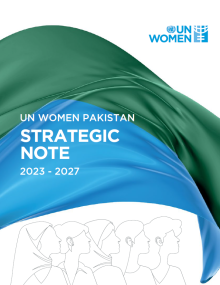1 - 13 of 13 Results
Date:
The manual is meant to support primarily policymakers, practitioners and service providers who can advocate for and enhance a whole-of-government and whole-of-society approach in developing and implementing reintegration policies and practices in a coordinated manner.
Date:
This publication showcases the results of Rapid Gender Assessment surveys (RGAs) on the impact of the coronavirus disease (COVID-19) in seven countries in Asia and the Pacific. For some of these countries, this is the second round of RGAs and thus these findings may follow up those of “Unlocking the Lockdown”. The report is meant to be a statistical snapshot that could inform responses to the crisis but is not meant to provide policy recommendations or analyze the policy context in each country.
Date:
The UN Security Council (UNSC) and different United Nations agencies, such as UN Women and the UN Population Fund (UNFPA) have identified VAW as a factor that deters women from participating in politics. Their reports have discussed the inherentrelationship between VAW and governance. They have shown VAW as a consequence of the failure of governance and have looked for ways to monitor and control such violence.
Date:
The study was designed to provide evidence in informing UN Women’s programme, “Promoting Women’s Political Leadership and Governance in India and South Asia.” A major focus of the study is on domestic violence.
Date:
This paper shines important light on a matter of increasing international interest: how to achieve gender responsive governance and advance the cause of gender equality and representative democracy?
Date:
The Concept Paper on Gender Responsive Governance examines the manner in which governance processes can be understood through a gendered framework. It discusses the evolving and expanding notion of governance.
Date:
This report tracks the progress made by women in South Asia in areas such as violence against women, and economic empowerment. This was the base document for the Seventh South Asia Regional Ministerial Conference in October 2010.
Date:
This report covers a joint resolution by women peace activists from South Asia that was presented to the United Nations Secretary-General.
Date:
This report presents the results and successes of joint programmes between the Government of India and UN Women to strengthen the leadership skills and confidence of women leaders in gram panchayats (village councils) so they can make informed decisions that benefit all.
Date:
The report of the final external evaluation of UNIFEM’s Regional Programme on Home-based Workers in South Asia (Phase II, 2004-2007) by CMS Social, covers Bangladesh, India, Nepal and Pakistan. The evaluation provides an in-depth analysis of UNIFEM’s programmes, approaches, strategies and interventions and advocacy initiatives to support HBWs.
Date:
The Report of the Sixth South Asia Regional Ministerial Conference co-hosted by the Ministry of Women and ChildDevelopment, Government of India and UN Women present analyses of issues across the region.
Date:
A comprehensive analytical report that maps the situation and status of women in South Asia, within the framework of 12 critical areas of concern identified by the Beijing Platform.
Date:
The Fifth South Asia Regional Ministerial Meeting – “Celebrating Beijing Plus Ten”, was as special as the year 2005 itself. A year of milestones for gender equality, it marks the tenth anniversary of the historic Fourth World Conference on Women at Beijing; 30 years since the First World Conference on Women at Mexico; and, five years since the Millennium Summit. Keeping alive the promise of Beijing, this regional review process, which began in 1996, is a collaborative undertaking involving all stakeholders, including Governments, NGOs, the SAARC secretariat, gender experts...

![[cover]](/sites/default/files/styles/search_image_140px/public/2024-02/bd-c652-pub2023027-el-regional-reintegration-960px.jpg?itok=5IyTMPC7)
![[cover]](/sites/default/files/styles/search_image_140px/public/2022-06/ap_BLS21551_004_UNW_RGA_Regional_Report-FINAL-14Jun22-cover-960px.jpg?itok=2Fjp4P1X)










